Water plays a pivotal role in human health at all stages of life, and perhaps even more so during infancy when bodies are growing and developing at an accelerated pace. Ensuring that your baby consumes safe and healthy water is a crucial responsibility for every parent. When it comes to hydrating your little one, there are two primary options that are often considered: purified water and spring water. But which of these is truly the best choice for your baby?
Navigating the world of infant nutrition can be confusing and even intimidating. From deciphering ingredient lists to understanding the benefits and potential drawbacks of different types of water, it’s understandable for parents to have questions. One of the most common queries is the distinction between spring water and purified water and, more importantly, which one is better suited for babies’ consumption. In this article, we will delve deep into the composition, pros, and cons of both water types, focusing on their implications for the health of your precious little ones. We aim to provide you with the knowledge needed to make an informed decision for your baby’s health and wellness. So, let’s dive right in.

An In-Depth Guide to Understanding the Differences
When it comes to the delicate health of a baby, the type of water used can have profound implications, whether it’s used for drinking or preparing infant formula. Two primary types of water commonly used are spring water and purified water.
Spring Water
Spring water, often found bottled in grocery stores, is sourced directly from natural springs [1]. This water is typically rich in essential minerals as it’s filtered naturally through rocks and earth, absorbing minerals such as calcium, magnesium, and potassium along the way. These minerals contribute to its taste and nutritional content, potentially offering some benefits for growing babies.
However, the mineral content in spring water can vary greatly depending on the source. It’s also important to note that not all spring water is equal in terms of purity. While some are filtered and treated to meet health or safety regulations, others may contain potentially harmful contaminants. Therefore, it’s crucial to always check for a reputable brand when purchasing spring water for babies.
Purified Water
Unlike spring water, purified water can come from any source, including tap water, but it undergoes a rigorous purification process to remove chemicals, pathogens, and other impurities. This can be achieved through various methods, including distillation, deionization, or reverse osmosis. Purified water often finds its way into our homes as bottled water, which can be convenient for on-the-go hydration or preparing baby formula.
When it comes to the comparison between purified vs. distilled water, the distinction lies in the purification process. Distilled water is a type of purified water that has been boiled into steam and then condensed back into liquid form in a separate container. This process removes minerals and most impurities. Distilled water for babies is often used, especially in preparing baby formula, as it is free from most contaminants.
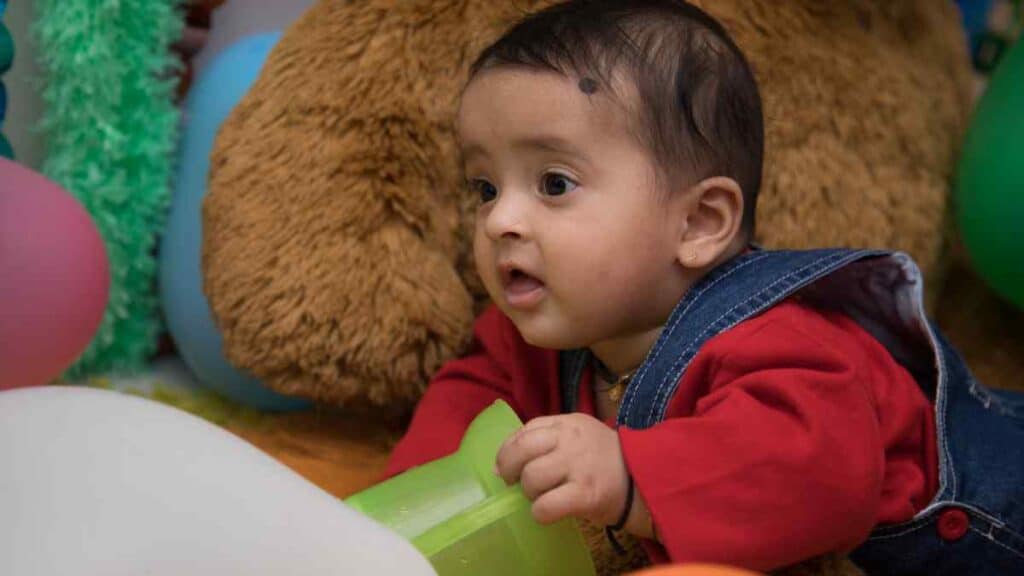
While purified water, including distilled water, is considered safe for babies, it lacks the natural minerals found in spring water. Also, there’s a common concern about the potential risk of water intoxication in infants if they consume too much water, including purified water, in a short period. Therefore, it’s essential to follow the recommended guidelines when preparing infant formula feeding, which typically involve using measured amounts of water.
It’s also worth noting that many varieties of purified bottled water, often labeled as ‘nursery water’ or ‘baby water,’ come with added fluoride. Fluoride is a mineral that can help prevent tooth decay, but too much fluoride can lead to faint white lines or streaks on your baby’s teeth, a condition known as dental fluorosis. Hence, when using fluoridated water, including fluoridated tap water, it’s crucial to consult with a pediatrician to ensure your baby isn’t getting excess fluoride.
Considerations for Infant Health
The quality of water your baby consumes plays a significant role in their overall health, primarily through the role of minerals and potential risks associated with harmful substances in water. This is particularly important in the context of preparing baby formula, where water quality can have direct nutritional implications for your little one.
Role of Minerals in Infant Health
Water, in its different forms, contains varying levels of dissolved minerals like calcium, magnesium, and potassium, which can contribute beneficially to your baby’s health. These minerals are important for several bodily functions, including bone development, heart health, and nervous system function. Therefore, when choosing the best water for baby formula, it’s crucial to consider the mineral content.
However, too much of certain minerals can lead to a condition known as mineral overdose, which can be harmful to your baby’s health. This is especially true for certain types of spring water, which can sometimes contain high levels of certain minerals. On the other hand, purified water, including distilled water, often has these minerals removed during the purification process.
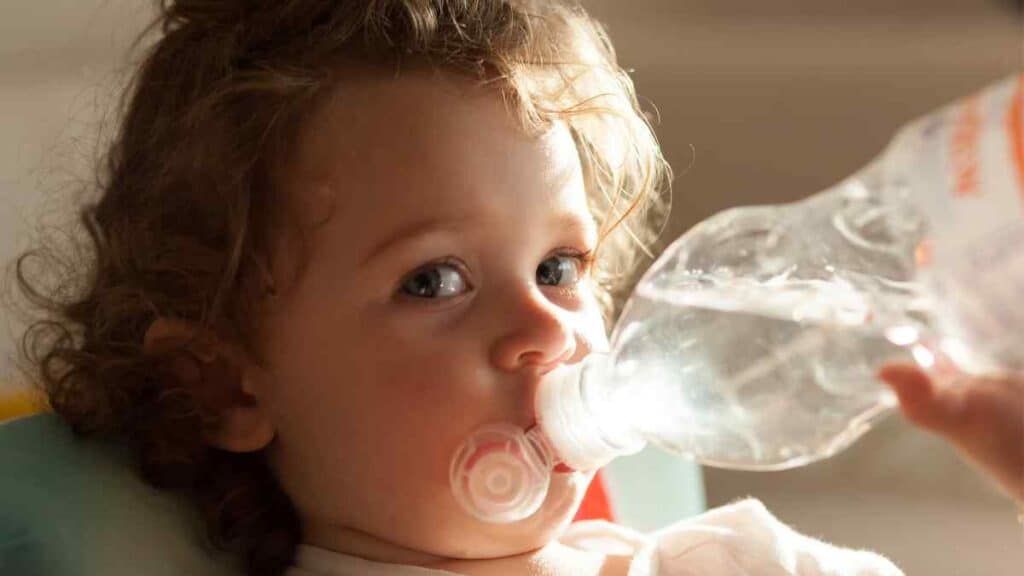
Potential Risks of Harmful Substances in Water
Despite its seemingly innocuous nature, water can sometimes contain harmful substances. This is particularly true for tap water, which, despite often meeting standard safety regulations, can sometimes contain trace amounts of organic chemicals, heavy metals, and other contaminants.
Bottled water, including low-fluoride bottled water or baby bottled water, often undergoes stringent testing to ensure it meets health standards. However, it’s crucial to note that not all bottled water is created equal. Some types, such as those purified through reverse osmosis, can remove both harmful contaminants and beneficial minerals.
Fluoridated water, which contains added fluoride to help prevent tooth decay, can pose a risk if your baby consumes too much fluoride. Too much fluoride can lead to a condition called fluorosis, which can affect the teeth and bones.
Special Considerations for Babies Under Six Months
For babies under six months, breastmilk or infant formula should ideally provide all the necessary hydration and nutrients. Water, whether it’s distilled water, purified water, or tap water, should generally only be introduced once solid foods are added to your baby’s diet, typically around six months.
When you do start introducing water, it should be pure water free of added sugars or flavorings. For mixing formula, boiled tap water is often recommended to ensure any potential contaminants are eliminated.
It’s also essential to watch for signs of water intoxication, which can occur if your baby consumes too much water. This can disrupt their electrolyte balance and can be harmful.
As always, consult your pediatrician or healthcare provider before making changes to your baby’s diet or feeding regimen. They can provide personalized advice based on your baby’s specific needs, such as recommending fluoride-free water if your baby is at risk of consuming too much fluoride.
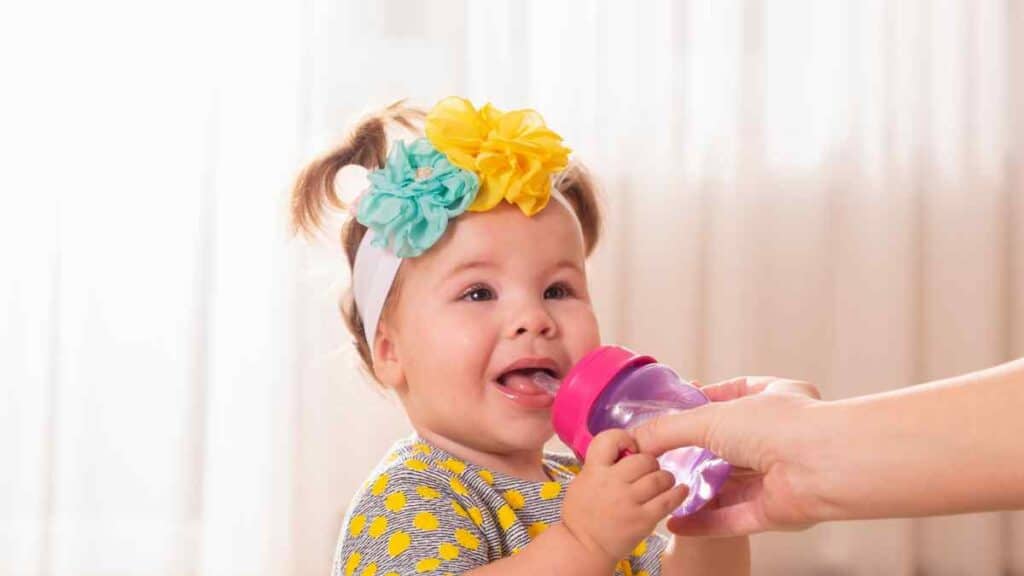
Spring Water for Baby Formula
When considering the type of water to use for your baby’s consumption or preparing baby formula, spring water often comes to the forefront. This is mainly due to its natural mineral content and unique taste. However, as with everything, there are both pros and cons to using spring water for babies.
Pros of Using Spring Water for Babies
- Natural Mineral Content: Spring water is sourced directly from natural springs, and in the process, it absorbs minerals such as calcium, magnesium, and potassium from the rocks and earth it passes through. These minerals are beneficial for your baby’s health, supporting a variety of bodily functions, including bone development, heart health, and nervous system function.
- Taste: Due to the presence of these minerals, spring water often has a better taste compared to purified or distilled water, which may make your baby more inclined to drink it.
Cons of Using Spring Water for Babies
- Risk of Contamination: Spring water, especially if not bottled by a reputable brand, can carry a risk of contamination. Depending on the source, spring water can sometimes contain contaminants like bacteria, viruses, parasites, or heavy metals, which could pose a risk to your baby’s health. Therefore, it’s crucial to choose spring water from a reputable source that conducts regular water quality testing.
- Variable Mineral Content: While the natural mineral content of spring water can be a pro, it can also be a con. The mineral content in spring water can vary greatly depending on the source. If the water contains high levels of certain minerals, it can potentially lead to a condition known as mineral overdose.
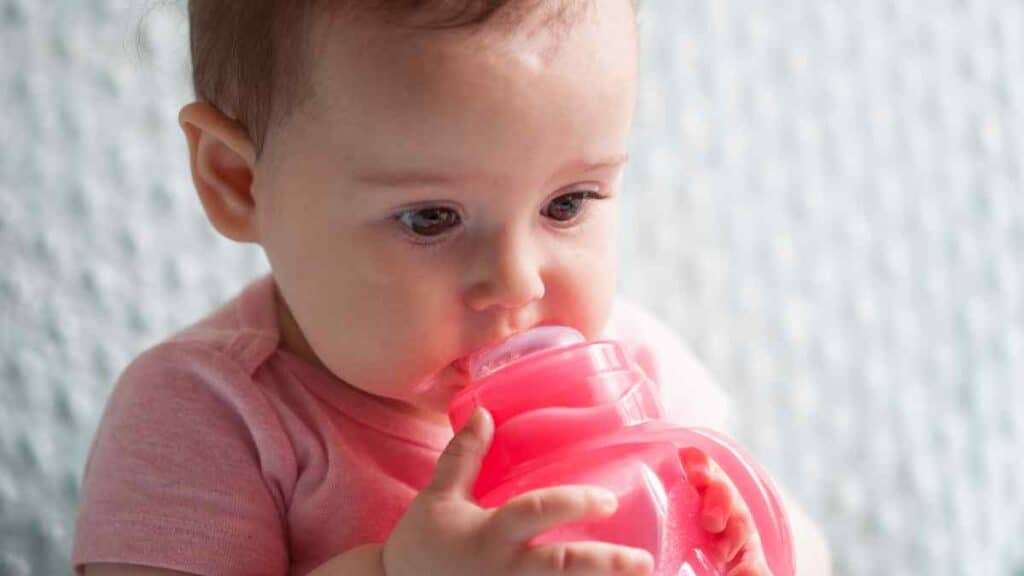
Precautions When Using Spring Water
If you decide to use spring water for your baby’s formula or as drinking water, there are several precautions you should take. First, it’s essential to ensure that the spring water meets safety standards. You can do this by buying from reputable brands that have their water tested regularly.
Second, consider using water filters to remove any potential contaminants that might be present in the water. A good filtration system can provide an added level of safety, particularly for tap water that originates from spring sources.
Third, boiling water is a commonly recommended practice when preparing infant formula, even when using bottled water. Boiling can help eliminate any remaining pathogens or contaminants in the water, ensuring that it’s safe for your baby.
Purified Water for Baby Formula
The choice of water you use to prepare your baby’s formula is crucial to their health. Purified water, including distilled and reverse osmosis water, is often recommended due to its high level of safety. However, there are pros and cons that parents should be aware of before deciding what water to use.
Pros of Using Purified Water for Babies
The main advantage of using purified water, such as distilled water, for your baby’s formula is safety. Purified water undergoes a process that removes most, if not all, contaminants. This process includes filtration, boiling, and condensation, which are highly effective at eliminating harmful bacteria, heavy metals, and other potentially harmful substances that might be present in tap water or spring water. This makes it an excellent choice when preparing infant formula, as you can be confident it is free from potentially harmful substances.
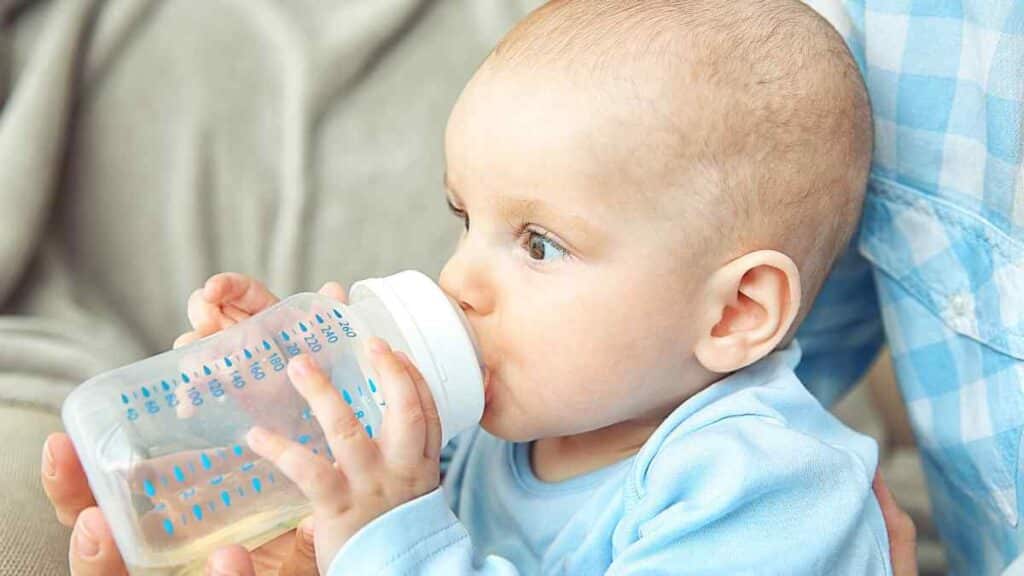
Cons of Using Purified Water for Babies
Despite its safety, purified water does come with some downsides. The main one is its lack of natural minerals, which are often removed during the purification process. These minerals, sometimes referred to as dissolved salts, play a crucial role in your baby’s health and development. This lack of minerals could be a concern, especially if purified water is your baby’s primary source of hydration as they grow and start consuming less formula.
Purified water may also lack fluoride, an important mineral that helps prevent tooth decay. However, too much fluoride in early childhood can lead to fluorosis, a cosmetic condition that can affect the permanent teeth. While fluoride-free water may be recommended for babies who are at risk of too much fluoride exposure, it’s crucial to note that your baby might need fluoride supplements later, especially if your water supply is fluoride-free.
Precautions When Using Purified Water
When using purified water for your baby’s formula, it’s important to take certain precautions. Firstly, it’s recommended to still boil the purified water before mixing formulas, especially for babies under six months. Boiling ensures any potential remaining contaminants are eliminated.
Secondly, consider the source and processing of your purified water. Ensure it comes from a reputable brand and the water is tested regularly to confirm its purity.
Lastly, consult with your pediatrician or healthcare provider about the use of purified water, especially concerning its lack of fluoride. They can provide personalized advice and may recommend fluoride supplements if necessary.

Conclusion
In the debate between purified versus spring water for babies, it’s clear that both types have their merits and drawbacks. Spring water provides a natural source of minerals essential for your baby’s development but carries the risk of potential contaminants. On the other hand, purified water, including distilled water, provides a highly safe option due to its rigorous purification process, but lacks natural minerals that are beneficial for your baby’s growth.
Ultimately, the choice depends on your individual circumstances, your water source, and your baby’s specific needs. No matter which type of water you choose, safety should always be the top priority. Always ensure that the water you use meets the appropriate safety standards, whether that means purchasing from reputable brands, using a water filter, or boiling the water before use.
Did this article help you? Please let me know if you have any questions in the comments below.



